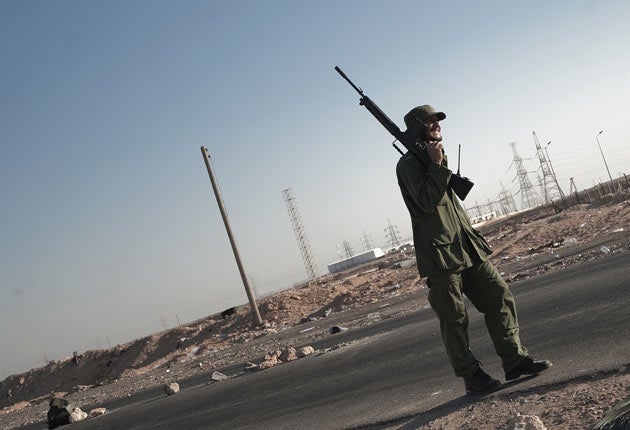Concern over suspected atrocities by rebel fighters

The killings were pitiless. They had taken place at a makeshift hospital, in a tent marked clearly with the symbols of the Islamic crescent. Some of the dead were on stretchers, attached to intravenous drips. Some were on the back of an ambulance which had been shot at. A few were on the ground, seemingly attempting to crawl to safety when the bullets came.
Around 30 men lay decomposing in the heat. Many of them had their hands tied behind their back, either with plastic handcuffs or ropes. One had a scarf stuffed into his mouth. Almost all of the victims were black men. Their bodies had been dumped near the scene of two of the fierce battles between rebel and regime forces in Tripoli. "Come and see. These are blacks, Africans, hired by Gaddafi, mercenaries," shouted Ahmed Bin Sabri, lifting the tent flap to show the body of one dead patient, his grey T-shirt stained dark red with blood, the saline pipe running into his arm black with flies. Why had an injured man receiving treatment been executed? Mr Sabri, more a camp follower than a fighter, shrugged. It was seemingly incomprehensible to him that anything wrong had been done.
The corpses were on the grass verges of two large roundabouts between Bab al-Aziziyah, Muammar Gaddafi's compound stormed by the revolutionaries at the weekend and Abu Salim, a loyalist district which had seen three days of ferocious violence.
The United Nations yesterday issued an urgent call for restraint by both sides in the bloody and bitter endgame to the civil war. But the thirst for vengeance has been difficult to control, to which the morgues, hospitals and the urban killings fields of the Libyan capital bore testimony.
The regime has repeatedly unleashed appalling violence on its own people. But the mounting number of deaths of men from sub-Saharan Africa at the hands of the rebels, lynchings in many cases, raises disturbing questions about the opposition administration, the Transitional National Council (TNC) taking over as Libya's government, and about Western backing for it.
The atrocities have apparently not been confined to Tripoli: Amnesty International has reported similar violence in the coastal town of Zawiyah, much of it against men from sub-Saharan Africa who, it was claimed, were migrant workers.
It is understood that the suspected atrocities by rebel fighters have been raised with members of the TNC in recent days by British officials, who made clear their "concern" at the reports coming out of Tripoli and the expectation in London that anyone suspected of war crimes will face trial. The Foreign Office underlined that executions of pro-Gaddafi soldiers were as yet unverified.
A spokesman said: "We condemn all human rights abuses. The TNC leadership has made clear the need to avoid violence and reprisals and has repeatedly said that anyone found guilty of crimes will be held to account."
Ahmed Safar Warfalla was being held in a temporary "cell", a locked room, at a school in the suburb of Tajoura. He has been accused of spreading Gaddafi propaganda. The local militia was considering what to do with him.
Join our commenting forum
Join thought-provoking conversations, follow other Independent readers and see their replies
Comments
Bookmark popover
Removed from bookmarks